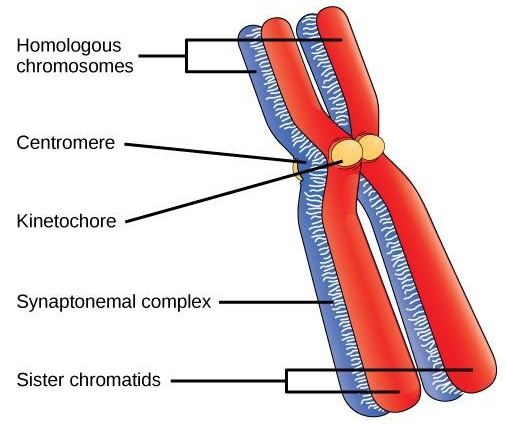
Dissolution of synaptonemal complex takes place during………………stage of meiosis.
Answer
493.5k+ views
Hint: Meiosis is the type of cell division which takes place in the reproductive cells that is male and female gametes. It involves intermixing of the genes by the process of crossing over. The synaptonemal complex is formed during crossing over. It occurs during meiosis 1.
Complete answer:
Synaptonemal complex is the protein structure that is formed between homologous chromosomes in meiosis. Meiosis takes place in two steps-Meiosis 1 and meiosis 2. Meiosis 1 is the reductional division where crossing over takes place. It leads to the formation of synaptonemal complexes. Meiosis 2 is similar to mitosis. Let us discuss the process of meiosis 1.
Meiosis 1- It is an important stage of the division in which is the reductional division. It takes place in the four steps Prophase 1 which comprises leptotene, pachytene, zygotene and diplotene stages followed by the metaphase, anaphase, telophase. The crossing over takes place in the prophase 1. During this the pairing of homologous chromosomes(zygotene) takes place followed by the exchange of the segments of the chromosome at the synapsis. It leads to the formation of the synaptonemal complex. This takes place at the pachytene stage. In the diplotene stage, the synaptonemal complex starts dissolving which leads to the separation of the bivalents except the site of crossing over. The X shaped structure formed is known as chiasma. The termination of chiasma takes place in the diakinesis stage.
The metaphase 1, anaphase 1, telophase 1 the bivalents arrange at the equatorial pole, formation of spindle, movement towards the pole and nuclear division takes place.

Dissolution of synaptonemal complex takes place during diplotene stage of meiosis.
Note: In meiosis 1 diploid chromosome divides to form 2 haploid chromosomes. In meiosis 2, the haploid cells undergo mitosis to form 4 haploid daughter cells. The daughter cells are not the clones rather they contain the genes of both the parents.
Complete answer:
Synaptonemal complex is the protein structure that is formed between homologous chromosomes in meiosis. Meiosis takes place in two steps-Meiosis 1 and meiosis 2. Meiosis 1 is the reductional division where crossing over takes place. It leads to the formation of synaptonemal complexes. Meiosis 2 is similar to mitosis. Let us discuss the process of meiosis 1.
Meiosis 1- It is an important stage of the division in which is the reductional division. It takes place in the four steps Prophase 1 which comprises leptotene, pachytene, zygotene and diplotene stages followed by the metaphase, anaphase, telophase. The crossing over takes place in the prophase 1. During this the pairing of homologous chromosomes(zygotene) takes place followed by the exchange of the segments of the chromosome at the synapsis. It leads to the formation of the synaptonemal complex. This takes place at the pachytene stage. In the diplotene stage, the synaptonemal complex starts dissolving which leads to the separation of the bivalents except the site of crossing over. The X shaped structure formed is known as chiasma. The termination of chiasma takes place in the diakinesis stage.
The metaphase 1, anaphase 1, telophase 1 the bivalents arrange at the equatorial pole, formation of spindle, movement towards the pole and nuclear division takes place.

Dissolution of synaptonemal complex takes place during diplotene stage of meiosis.
Note: In meiosis 1 diploid chromosome divides to form 2 haploid chromosomes. In meiosis 2, the haploid cells undergo mitosis to form 4 haploid daughter cells. The daughter cells are not the clones rather they contain the genes of both the parents.
Recently Updated Pages
Master Class 11 Computer Science: Engaging Questions & Answers for Success

Master Class 11 Business Studies: Engaging Questions & Answers for Success

Master Class 11 Economics: Engaging Questions & Answers for Success

Master Class 11 English: Engaging Questions & Answers for Success

Master Class 11 Maths: Engaging Questions & Answers for Success

Master Class 11 Biology: Engaging Questions & Answers for Success

Trending doubts
One Metric ton is equal to kg A 10000 B 1000 C 100 class 11 physics CBSE

There are 720 permutations of the digits 1 2 3 4 5 class 11 maths CBSE

Discuss the various forms of bacteria class 11 biology CBSE

Draw a diagram of a plant cell and label at least eight class 11 biology CBSE

State the laws of reflection of light

Explain zero factorial class 11 maths CBSE




